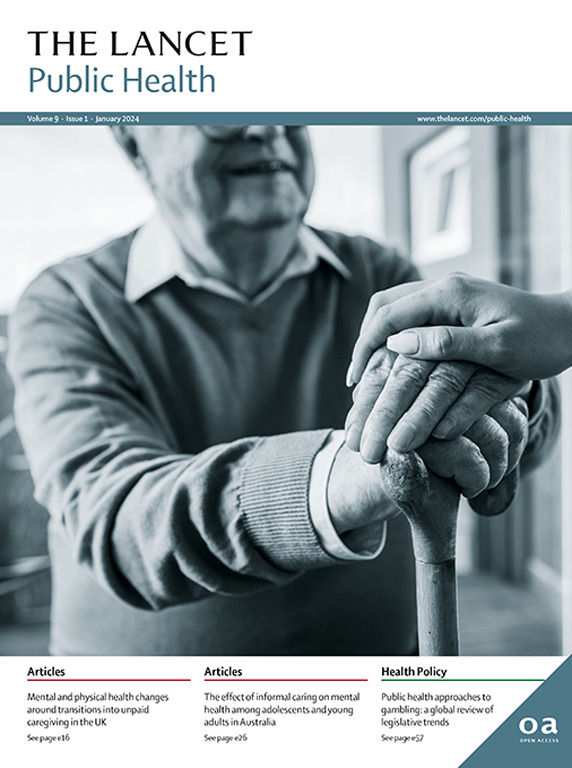听力干预对老年人跌倒的影响:来自ACHIEVE随机对照试验的二次分析结果
IF 25.4
1区 医学
Q1 PUBLIC, ENVIRONMENTAL & OCCUPATIONAL HEALTH
引用次数: 0
摘要
背景听力损失在老年人中非常普遍,并且与摔倒的可能性增加有关。我们的目的是在ACHIEVE研究的二次分析中检查听力干预对老年人3年以上跌倒的影响。方法老年人衰老和认知健康评估(ACHIEVE)研究是一项为期3年的、未加掩盖的、随机对照试验,纳入年龄在70-84岁、未经治疗的听力损失和无重大认知障碍的成年人。参与者是从两个研究人群中招募的四个美国社区现场站点:(1)正在进行的心血管健康观察性研究(社区动脉粥样硬化风险[ARIC]研究),以及(2)来自社区的新生。参与者被随机(1:1)分配到听力干预组(听力学咨询和提供助听器)或健康教育控制组(涉及慢性疾病预防主题的教学教育和丰富活动)。预先指定的探索性结果是跌倒。过去12个月自我报告的下降在基线和3年内每年进行评估,并通过协变量调整进行意向分析。该研究已在ClinicalTrials.gov注册,编号NCT03243422,并已完成。在2017年11月9日至2019年10月25日期间,对3004人进行了合格筛选,随机分配977人(238人(24%)来自ARIC研究,739人(76%)来自新生),其中490人(50%)来自听力干预组,487人(50%)来自健康教育对照组。总体平均年龄为78.6岁(SD 4.0),女性523人(54%),男性454人(46%),黑人112人(11%),白人858人(88%),其他种族7人(1%)。在调整分析中,与对照组相比,干预组在3年内平均跌倒次数减少了27%(干预组:1.45 [95% CI 1.28至1.61];对照组:1.98 [1.82 ~ 2.15];平均差异:- 0.54 [95% CI - 0.77至- 0.31])。这种为期3年的听力干预效果在ARIC和新生研究人群中是一致的。听力干预与健康教育对照与老年人3年内平均跌倒次数的减少有关。在一项单独的随访研究(NCT05532657)中,对ACHIEVE参与者的持续随访将能够检查听力干预对跌倒的长期影响。资助美国国立卫生研究院。本文章由计算机程序翻译,如有差异,请以英文原文为准。
Effects of hearing intervention on falls in older adults: findings from a secondary analysis of the ACHIEVE randomised controlled trial
Background
Hearing loss is highly prevalent among older adults and has been associated with an increased likelihood of falling. We aimed to examine the effect of a hearing intervention on falls over 3 years among older adults in a secondary analysis of the ACHIEVE study.Methods
The Aging and Cognitive Health Evaluation in Elders (ACHIEVE) study was a 3-year, unmasked, randomised controlled trial of adults aged 70–84 years at enrolment with untreated hearing loss and without substantial cognitive impairment. Participants were recruited at four US community-based field sites from two study populations: (1) an ongoing observational study of cardiovascular health (Atherosclerosis Risk in Communities [ARIC] study), and (2) de novo from the community. Participants were randomly assigned (1:1) to a hearing intervention (audiological counselling and provision of hearing aids) or a health education control (didactic education and enrichment activities covering chronic disease prevention topics). A prespecified exploratory outcome was falls. Self-reported falls in the past 12 months were assessed at baseline and annually for 3 years, and analysed by intention to treat with covariate adjustment. The study was registered with ClinicalTrials.gov, NCT03243422, and is completed.Findings
Between Nov 9, 2017, and Oct 25, 2019, 3004 individuals were screened for eligibility and 977 (238 [24%] from the ARIC study and 739 [76%] de novo) were randomly assigned, with 490 (50%) in the hearing intervention group and 487 (50%) in the health education control group. Overall mean age was 76·8 years (SD 4·0), 523 (54%) participants were female and 454 (46%) were male, and 112 (11%) were Black, 858 (88%) were White, and seven (1%) were other race. In adjusted analyses, the intervention group had a 27% reduction in the mean number of falls over 3 years compared with the control group (intervention group: 1·45 [95% CI 1·28 to 1·61]; control group: 1·98 [1·82 to 2·15]; mean difference: –0·54 [95% CI –0·77 to –0·31]). This 3-year effect of hearing intervention was consistent across both the ARIC and de novo study populations.Interpretation
Hearing intervention versus a health education control was associated with a reduction in the mean number of falls over 3 years in older adults. Ongoing follow-up of ACHIEVE participants in a separate follow-up study (NCT05532657) will enable examination of the longer term effects of hearing intervention on falls.Funding
US National Institutes of Health.求助全文
通过发布文献求助,成功后即可免费获取论文全文。
去求助
来源期刊

Lancet Public Health
Medicine-Public Health, Environmental and Occupational Health
CiteScore
55.60
自引率
0.80%
发文量
305
审稿时长
8 weeks
期刊介绍:
The Lancet Public Health is committed to tackling the most pressing issues across all aspects of public health. We have a strong commitment to using science to improve health equity and social justice. In line with the values and vision of The Lancet, we take a broad and inclusive approach to public health and are interested in interdisciplinary research.
We publish a range of content types that can advance public health policies and outcomes. These include Articles, Review, Comment, and Correspondence. Learn more about the types of papers we publish.
 求助内容:
求助内容: 应助结果提醒方式:
应助结果提醒方式:


